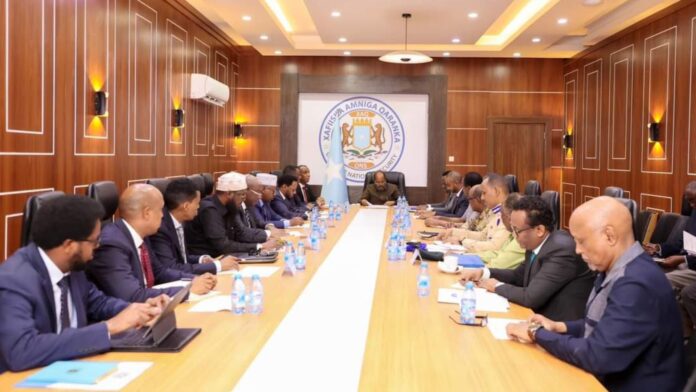Somalia needs to overcome its long-standing security challenges and rebuild its security infrastructure in a comprehensive and manageable manner. This will enable the country to fulfil its responsibilities as an independent nation on the global stage, as requested by the Security Council.
The understanding of their role within Somali institutions seems to elude many members of the Somali parliament. They appear to be unaware of the significant challenges that the country faces and the importance of the next 12 months. Instead of aiding in the crucial task of redesigning the Somali security infrastructure, they are engaged in trivial political disputes.
By December 2024, the African Union forces are set to withdraw from Somalia, leaving the country responsible for its security. Given the gravity of the situation, Somali President Hassan Shiekh Mohamud has taken the initiative to personally address the longstanding security issues and relocated to Galmuddug State. This is a necessary step to ensure that Somalia does not miss out on this critical opportunity.
There is a belief among certain security experts that the government does not lack security expertise, but rather the willingness to appoint qualified individuals to appropriate positions. While one year may not seem like a significant amount of time, the magnitude of the task at hand is immense.
Addressing various elements of insecurity can be tackled in a step-by-step manner, with a gradual implementation of the following ideas in different stages within the country. Parliamentarians must play a crucial role in facilitating the necessary work at this critical stage.
◇ Enhanced border security:
Strengthening border controls and enhancing surveillance systems can help in preventing illegal movement of goods, weapons and drugs. This can include investing in technology such as drones and communication networks.
◇ Regional cooperation and intelligence sharing:
Encouraging collaboration and information-sharing among Somali States can facilitate the identification and tracking of criminal networks operating within the country. Establishing joint task forces and intelligence gathering work can improve response times and enable co-ordinated efforts in combating all forms of crimes.
◇ Community policing and engagement:
Investing in community policing programs can help build trust between law enforcement agencies and local communities. This can include training programs, infrastructure development, and initiatives that promote dialogue, cooperation and reconciliation among Somali clans in a meaningful way.
◇ Strengthening legal frameworks:
Reviewing and updating legal frameworks related to security to address emerging threats is essential. This includes legislation against organized crime, corruption, and money laundering, accompanied by effective implementation and enforcement mechanisms.
◇ Capacity building:
Investing in training and equipping security forces, judiciary, and law enforcement agencies with modern skills, tools, and resources is crucial. Strengthening institutions and promoting professionalism within security sectors can enhance response capabilities and adherence to human rights principles.
◇ Addressing root causes of insecurity:
Putting measures in place to address the root causes of insecurity, such as poverty, inequality, and social exclusion, is fundamental. This can involve promoting inclusive development, providing access to quality education, healthcare, and employment opportunities, thereby reducing vulnerabilities that lead to criminal activities.
◇ Early warning systems:
Establishing early warning systems for conflict, natural disasters, and disease outbreaks can help mitigate security risks. These systems can enable timely responses, including the deployment of security forces, humanitarian aid, and coordination with international partners.
in conclusion, the successful implementation of these ideas necessitates significant financial resources, political determination, and collaboration among genuine Somali stakeholders, along with support from international partners.
The Somali public expects the parliament to prioritize the reconstruction of the Somali security infrastructure and set aside all other non-essential tasks to focus on achieving the crucial goal of effectively managing Somalia’s security, ensuring that the country does not miss this opportune moment for progress.
The end.
Mohamed Mohamud Adde
An academic and Political Analyst


